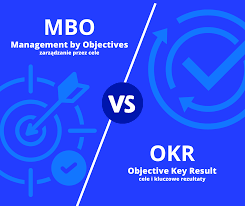Performance reviews are vital for assessing how well employees are meeting their goals and contributing to the organization. Two of the most widely used goal-setting frameworks—OKR (Objectives and Key Results) and MBO (Management by Objectives)—are often compared in terms of their effectiveness in improving performance. But which one leads to stronger performance reviews? Let’s dive into the core differences, strengths, and weaknesses of each to see which framework holds the advantage.
What Are OKRs?
OKR, or Objectives and Key Results, is a goal-setting framework designed to create alignment and transparency within organizations. It focuses on setting ambitious objectives and then breaking them down into measurable key results. The approach encourages a top-down alignment of goals from leadership to teams, ensuring that everyone is working toward the same mission. OKRs were popularized by companies like Google, who embraced the framework for its simplicity and agility.
What Is MBO?
MBO, or Management by Objectives, is a goal-setting approach introduced by Peter Drucker in the 1950s. It is based on the idea that managers and employees should work together to set clear, measurable objectives, and that employee performance should be assessed based on how well they achieve these objectives. MBO is often seen as more formal and structured, with a strong focus on individual accountability.
The Core Differences Between OKR and MBO
Here are some core differences between OKR and MBO mentioned below
- Goal-Setting Approach: OKRs are typically set with ambitious, stretch goals in mind, pushing employees to achieve more than they might with standard targets. MBO, on the other hand, focuses on specific, achievable objectives agreed upon by both the manager and the employee.
- Timeframe: OKRs are often set for shorter periods (quarterly or annually), with regular check-ins to adjust the approach. MBO tends to work on longer cycles, often aligning with annual performance reviews.
- Flexibility: OKR encourages frequent adjustments and recalibration of goals as the company evolves. MBO is more rigid, with predefined objectives that are less likely to change during the evaluation period.
How OKR Works for Performance Reviews
In the OKR framework, performance reviews are directly tied to the objectives and key results an employee works on during a specific period. Managers evaluate both the success of the key results and how employees have worked towards their objectives. The process tends to be more dynamic, with ongoing feedback provided throughout the goal-setting cycle. For instance, if a team’s objective is to increase customer satisfaction, key results might include measurable improvements in Net Promoter Score (NPS) or customer retention rates.
How MBO Works for Performance Reviews
With MBO, performance reviews focus on whether an employee has achieved the specific objectives set at the beginning of the year. There is typically less room for deviation, as the goals are fixed and tied to the employee’s role. The traditional MBO review process is more rigid and looks at individual accomplishments rather than broader team or company goals.
OKR: Pros and Cons
Pros:
- Encourages innovation with stretch goals.
- Provides clarity through measurable key results.
- Offers flexibility with regular check-ins and adjustments.
Cons:
- Can be challenging for organizations unfamiliar with rapid goal-setting cycles.
- The focus on stretch goals may sometimes lead to unrealistic expectations.
MBO: Pros and Cons
Pros:
- Clear, achievable objectives make it easier to measure success.
- Strong focus on individual accountability and personal goals.
Cons:
- Can become rigid and inflexible, limiting innovation.
- Less focus on team and company-wide alignment.
Which Framework Is More Adaptable to Change?
When comparing the adaptability of the two frameworks, OKR stands out for its flexibility. Since OKRs are designed to be adjusted frequently, they fit well with fast-paced, dynamic environments. MBO, however, tends to work better in more stable settings, where long-term objectives remain unchanged.
Impact on Employee Engagement and Motivation
OKRs, by their nature, promote transparency and cross-functional collaboration, often leading to higher levels of engagement. Employees feel empowered to take ownership of their objectives. MBO, while motivating in its own right, can sometimes feel more isolating since it emphasizes individual objectives over team efforts.
How OKR Enhances Team Collaboration
Because OKRs are often set at both the team and company levels, they naturally foster collaboration. Teams work together to achieve common goals, ensuring that everyone is aligned with the broader mission.
MBO’s Influence on Individual Accountability
MBO’s structure promotes a strong sense of individual responsibility. Employees are solely accountable for their objectives, which can lead to high performance when objectives are clearly defined and agreed upon.
Which Framework Provides Clearer Metrics?
OKR excels in providing clear, measurable metrics through key results. Every objective is paired with specific, quantifiable results that make it easier to track progress. MBO also relies on metrics, but these can sometimes be more qualitative, making it harder to measure progress objectively.
Which Framework Leads to Stronger Performance Reviews?
While both OKR and MBO have their merits, OKR tends to result in more dynamic and transparent performance reviews. The regular check-ins, focus on stretch goals, and measurable key results provide a clearer picture of employee contributions. MBO, while structured and straightforward, can sometimes lack the flexibility and breadth that OKR offers.
Conclusion
Both OKR and MBO are effective goal-setting frameworks, but OKR’s flexibility and emphasis on collaboration often make it a better fit for modern, fast-paced environments. If your organization values innovation and regular feedback, OKR may lead to stronger performance reviews. MBO remains a strong option for companies looking for structure and individual accountability.
FAQs
What is the main difference between OKR and MBO?
OKR focuses on stretch goals and frequent adjustments, while MBO emphasizes clear, achievable objectives over a longer period.
Can OKR and MBO be used together?
Yes, some companies use a hybrid approach, leveraging the flexibility of OKR and the structure of MBO.
Which framework is better for startups, OKR or MBO?
OKR is often better for startups due to its adaptability in fast-changing environments.
How often should performance reviews be conducted in each framework?
OKRs are typically reviewed quarterly, while MBO often aligns with annual performance reviews.
What are the biggest challenges in implementing OKR or MBO?
For OKR, the challenge is setting realistic yet ambitious goals, while for MBO, it’s avoiding rigidity and maintaining flexibility.



